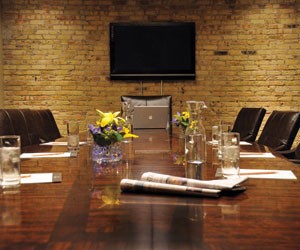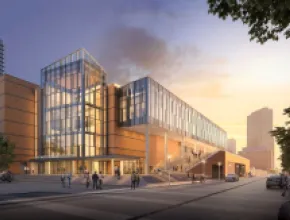In the current economic tailspin, where upscale brand-name hotels can bring perception problems for groups, boutique hotels are taking on added appeal for small meetings. They also offer more versatility in meeting spaces than may be expected.
"Many boutique hotels don’t have the problem that a lot of the big-name resorts have," says Cherie Davis, general manager of the Hotel Maya Long Beach, a boutique hotel that opened in Long Beach, Calif., this summer. "Smaller, more independent hotels don’t have the perception of being lavish resorts."
Referring to the fallout from the so-called "AIG effect," which shed light on lavish corporate spending during a time of federal bailouts, Davis says many companies are not just out to save money, but to save face.
"The AIG effect is not going to drive businesses to go to a Days Inn to hold meetings," Davis says. "There has to be a middle ground. Planners are shopping around more than ever."
"It is what it is," adds Benji Homsey, president of Dallas-based Z Resorts, the development and management company that heads up operations and marketing of two luxury boutique hotels, Hotel ZaZa Dallas, located in pedestrian-friendly Uptown Dallas, and Hotel ZaZa Houston, located in Houston’s Museum District. "Our hotels are upscale. But we are fighting through this time and doing whatever we can to work with planners. It would be foolish not to."
Along with being perception-friendly, boutique properties, often known for their quirky architectural character or atmosphere, tend to offer unique meeting spaces for small groups.
At Hotel ZaZa Houston, groups can brainstorm in the Kitchen of the Mind, an 800-square-foot room that features a kitchen, a long table and pots and pans (along with rubber chickens) hanging from the ceiling.
"When you have a house party, where does the group end up? The kitchen," Homsey notes. "It’s a great place for groups to hang out and do a lot of thinking."
Boutique hotels are proving that they are more than hip, "lifestyle" hotels. They have flexible meeting space, offer a number of value-adds and are keen to point groups to attractions that cater to specific interests. In addition, boutique hotels are looking for ways to dazzle planners when it comes to customer service.
"Everybody knows that good customer service is important," Davis says. "But now the emphasis is on the personal touch. Great amenities are important, but customer service is the defining factor."
Tough Times
Boutique hotels are stepping up their game to appeal to groups during the recession.
"We’ve had cancellations like most hotels," Homsey says. "What we have said to the planner is we’ll put the non-refundable deposit toward a future meeting or maybe two future events. We don’t feel comfortable just taking the money. It’s not that people don’t want to have meetings. Everyone is pulling back right now."
Davis points out that customer service has always been a hallmark of boutique properties catering to small meetings, but with the economy in a tailspin there’s even more emphasis on it.
"We ask ourselves, ‘Can we do something special in our food and beverage offerings? How can we connect with members of the group? How can we make the meeting planner shine?’" he says.
Smaller hotels may have a leg up on the competition in these respects because of their emphasis on intimacy, says Anna Anderson, general manager of The Iron Horse Hotel in Milwaukee.
"We are already used to dealing in close contact with planners," Anderson notes. "Now we are marketing to planners one-on-one. And in that marketing, we are emphasizing the other aspects of the destination more."
Homsey agrees, adding that "maybe we include the ‘turf’ but not the ‘surf’ on the menu. The key is to be as flexible as possible."
Flexing Muscles
Boutique hotels are proving that they have the flexibility to transform group spaces just like their larger counterparts in the hotel industry.
In summer, lounging around the pool at Hotel ZaZa Dallas is popular with groups. Come winter time, groups can meet for alfresco receptions on top of the pool thanks to a specially designed Plexiglas "floor" that is placed over the pool for catered events during day or evening. The space can be tented. The pool’s floor space and adjoining bar area, known as the Urban Oasis, totals 1,976 square feet.
"The restaurant, which is so popular with locals, is near the pool," Homsey notes. "It’s turned out to be a space that captures the energy of Uptown Dallas."
Group meetings can also be held in suites, dubbed The Magnificent Seven, at both Hotel ZaZa properties. The seven suites range in size from about 1,200 to 2,400 square feet. Each has its own theme.
For example, Hotel ZaZa Dallas includes the Leonardo Suite, which measures 1,312 square feet and includes a collage of the Renaissance master’s sketches. The room serves as a memorable location for a board or business meeting.
Some of the suites offer full kitchens and balconies, features that come in handy for receptions and dinners. The Bella Vita Suite at the Houston hotel is accessible to individuals with disabilities. The Dallas hotel includes 3,500 square feet of meeting space, while the Houston property features 18,000 square feet of meeting space
Flexibility of space is the name of the game at Hotel Maya Long Beach. Formerly the Coast Long Beach Hotel, the property was purchased by Joie de Vivre Hospitality and underwent an estimated $20 million renovation.
The Hotel Maya debuted July 1, and the property is planning to have an official grand opening this month. According to Davis, the venue’s waterfront wedding pavilion doubles as premium outdoor event space for groups.
"Planners will want to take advantage of the pavilion since our property is six feet from the ocean," Davis says. "In this economic environment, a manager at a boutique hotel can’t say, ‘This space is only for weddings.’ We have to be flexible."
Hotel Maya Long Beach features 20,000 square feet of meeting space. Davis says the property can comfortably accommodate a group of 300. But recently, one event planner visited the property, and impressed by the ocean views (particularly the waterfront ballroom) and the flexibility of the venue, determined that she could easily hold a function for 600 guests.
At Milwaukee’s Iron Horse Hotel, the two-story lobby atrium is used for receptions.
"The hotel is in a 100-year-old warehouse, and the rustic architecture reflects this," Anderson says.
It’s entirely possible to go from a fun cocktail hour with board members and their guests to a brainstorming session in the War Room, a 425-square-foot conference room in the hotel’s 5th Floor Executive Suite. The suite also includes the Sand Box, where groups can meet, dine or break the ice with a game of bowling on a Nintendo Wii. The hotel accommodates groups of up to 200 people.
Small Trends
Small meetings at boutique hotels tend to be more intimate compared to events at larger chain or branded hotels. One trend among boutique hotels is serving groups by finding new ways to help attendees connect with the destination and each other.
Desires Hotels, which operates The Iron Horse in Milwaukee, along with boutique hotels in New York City, Miami (where The Betsy opened on April 1 in South Beach) and San Juan, Puerto Rico, features an interactive trip planner tool on its website. Planners can answer questions about goals to customize and edit group itineraries.
"We’re continuing to look for ways to combine meetings with day trips or other events, depending on the interests of the group," Anderson says. "We have the Harley-Davidson Museum and the Milwaukee Art Museum close by, but we are looking for more options."
Anderson and her staff are looking at the possibility of getting interested groups on the race track at Road America, a road course located near Elkhart Lake, Wis. A road course consists of public roads used for racing automobiles and/or motorcycles.
The destination is the focus at the newly opened Black Rock Oceanfront Resort in Ucluelet, British Columbia.
"Planners looking at boutique hotels are looking for the non-traditional meeting space," says Christie McJannet, regional director of sales with Boutique Hotels and Resorts of British Columbia, which manages Black Rock and five other boutique properties in the Canadian province. The company is gearing up to open a seventh, Watermark Beach Resort in Osoyoos.
At the Black Rock property, which is located on the west coast of Vancouver Island, receptions can be held in the hotel’s wine cellar, which has a floor-to-ceiling window perched over an 80-foot-wide surge channel.
"No matter where the group gathers, we want to impress upon them this amazing destination," McJannet says. "It’s something new and different, and in this economic environment, planners are looking for more ‘wow,’ more value."






